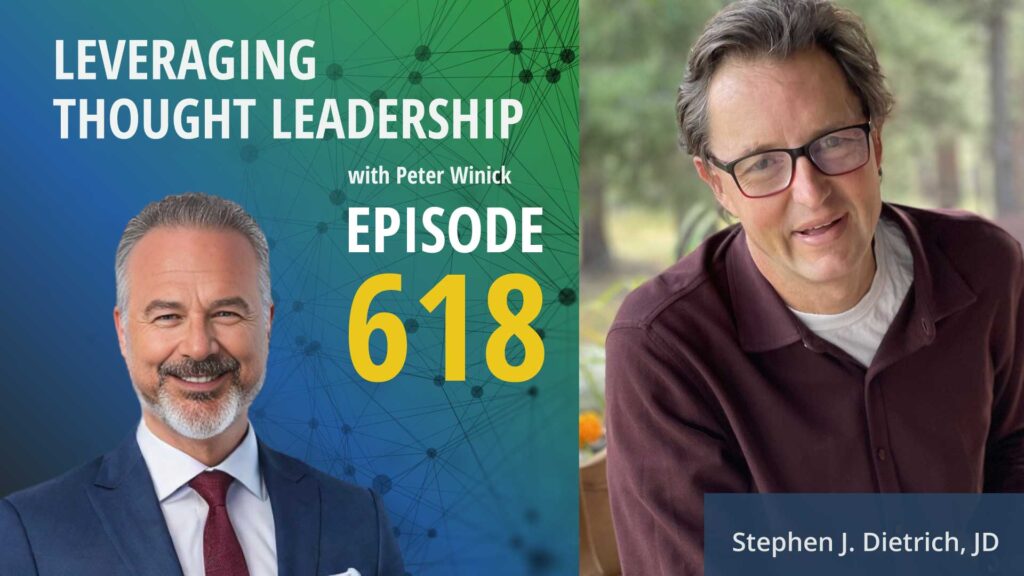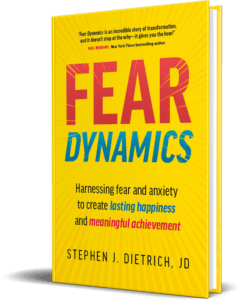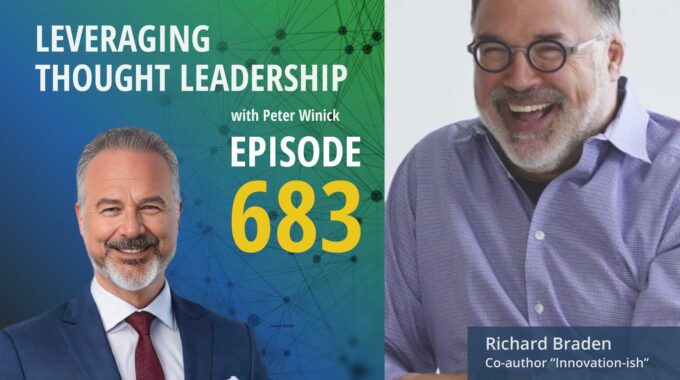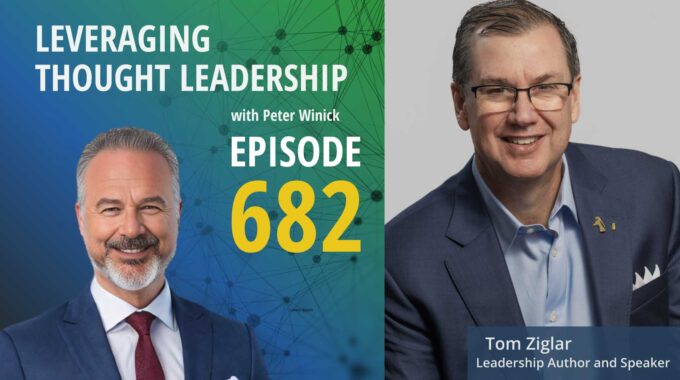How Top Leaders Balance Learning and Performance for Long-Term Success This episode explores the “performance…
Breaking the Stigma: Mental Health in the Professional World | Stephen J. Dietrich

The Fear Factor in Thought Leadership
Can vulnerability drive business success?
Corporate attorney Stephen Dietrich shares how tackling fear and anxiety transformed his personal life and skyrocketed his professional growth. In this episode, he and Peter Winick explore the power of emotional openness to build trust, deepen relationships, and achieve exceptional outcomes.
What happens when a high-powered attorney decides to tackle fear and anxiety head-on?
On this episode of Leveraging Thought Leadership, Peter Winick speaks with Stephen J. Dietrich, corporate M&A attorney and author of Fear Dynamics: Harnessing fear and anxiety to create lasting happiness and meaningful achievement.
Stephen shares how introspection and personal growth reshaped his approach to life and business. He explains how addressing emotional and mental health helped him not only find happiness but also skyrocket his professional success.
Stephen discusses the surprising link between vulnerability and stronger client relationships. He details how embracing openness led to better teamwork, trust, and deeper connections in his law practice. His story challenges conventional thinking, proving that emotional honesty can drive exceptional business outcomes.
From mental health stigma to corporate performance, Stephen’s journey is a powerful example of how courage and self-awareness can transform both individuals and organizations. This conversation is packed with insights for leaders ready to rethink how they engage with their teams
and clients.
If you’re wondering how emotional well-being can align with professional excellence, this episode will leave you inspired.
Three Key Takeaways
Vulnerability Builds Trust: Embracing emotional openness can deepen relationships with clients, colleagues, and teams, fostering collaboration and mutual respect.
Mental Health Drives Success: Addressing fear and anxiety not only enhances personal happiness but also leads to measurable improvements in professional performance and business outcomes.
Modeling Behavior Matters: Leaders who demonstrate transparency and resilience create an environment where others feel empowered to engage authentically, driving better teamwork and innovation.
Thought Leadership like what Stephen is doing has the power to change lives but getting it into the world can be an uphill battle. If you feel like you are losing your passion for thought leadership, read this article to get some tips from Peter on how to Reevaluate, Retool, and Reengage.
Transcript
Peter Winick And welcome, welcome, welcome. This is Peter Winick. I’m the founder and CEO at Thought Leadership Leverage. And you’re joining us on the podcast today, which is Leveraging Thought Leadership. Today, my guest is Stephen Dietrich. He is an attorney. So, hold that against him. He is the author of Fear Dynamics. And he’s got a really, really interesting story as to how he kind of got into this world of thought leadership. So welcome aboard today, Steve.
Stephen Dietrich Thanks, Peter. Appreciate the time and the ability to talk about the book.
Peter Winick Yeah. So first, tell us what your day job is, because it’s not what one would expect once we get into the fun stuff here.
Stephen Dietrich Well, my day job and sometimes my night job is I’m a corporate M&A attorney, mergers and acquisitions attorney with the law firm Holland Knight. And I essentially spend a lot of my time helping people buy and sell their businesses. I do a lot of work in the auto dealership space. So that’s what I do, very high level.
Peter Winick And then you wrote a book. So tell us a little bit about the back story of Fear Dynamics. Where did this come from and how did it come to be? Because most attorneys that I know aren’t looking for things to do that will take up a ton of their time and reduce their billable rate.
Stephen Dietrich Well, it came about because I started to do a fair amount of introspection and personal work on myself, not necessarily professionally. And in 2009, because I needed to make some changes in my life on the personal side of things as I went forward. And as I went through that work, I realized I did a lot. I’ve tried a lot of different things and some more fit, some more starts and other things. And ultimately I became a much happier person. But my life itself really didn’t change it to many on the outside. I was still a lawyer, still living in Denver, still married to the same person. But I was a lot happier. And then the other kicker was my business took off. And so I thought, this is sort of unique for me and trying to figure it out. And I thought, I need to tell people about it. And so, as you said, I’m a lawyer, not necessarily someone who can talk a lot about mental health and have credibility. And so I ultimately came to the decision in conclusion that in order for people to engage in these conversations, which is what I really want, I needed to write something that put it all out there, kind of like a calling card so people could say, this person actually put some thought into it, not just a random blog post. And so the book came from that desire to try to create some credibility and provide a story of hope to people with what I’ve done. So that’s what spurred the writing of this book.
Peter Winick Right. So there’s not a lot and what I found it one of the things I found interesting is not a business driver underneath that. This is really a passion play to get this out there. And there’s lots of reasons folks write books. Some of this for you was the forcing mechanism to get it down in a concise and coherent and cogent way. Right. You could have ended this with an interesting 1500 word blog post on. Let me tell you what I’ve been thinking about. Right. Even if it got a little buzz or whatever, that could have been cool. But why did you keep going deeper and deeper? And I’ll sort of put underneath that. I don’t work with folks that write self-help books, but I’ve had many a client tell me I wrote a self-help book that I needed to help me write. So it feels like it that sort of the way you write it.
Stephen Dietrich Well, I think I wrote it because I think it’s a story that might be interesting to people and not necessarily the personal side of a story, but the concept of life change and other aspects from the standpoint of someone who’s objectively successful, whatever you may know or not know about lawyers, If you look at it, I’ve actually objectively succeeded in this industry in the last 25 or 30 years. And so no one’s talking about these issues. And I’m trying to normalize these conversations about mental and emotional health. And similar to, you know, if I walk in and I’m walking with a with a boot, say, hey, you know, I broke my ankle playing pickleball. People can talk about that all day long. But if I but the issues of fear and anxiety as they impact both personal and professional, that’s not normalized. And I thought maybe I have an opportunity here because of my objective success in my profession. Yeah. This might be helpful to talk to people and give some people some hope.
Peter Winick And stay there for a minute. Because if someone were to hand me your book and I didn’t look you up. I would make an assumption that’s wrong, that, this is probably some sort of mental health professional. I’m looking to see M.D. at the end, or he’s a psychiatrist or a therapist or part of psychological safety or whatever. So it’s really, really interesting. You know, on the one hand, you’d say, well, why would I sort of take the I don’t mean that someone would take the advice of a lawyer on mental health, like. But then it makes total sense to say, yeah, okay, I get what the professional world says, but here is a professional kind of like me that went through this journey, that learned these things and wants to share it to me in a non-clinical way. Right.
Stephen Dietrich Yeah. Yeah. In what way? Oddly enough, one of the reasons I put JD in the title and the title of the book is Steve Dietrich, J.D. one. I’m not a trained therapist. I haven’t done scientific research. This is a story about what a, you know, a normal human being actually went through. A lot of what’s in the book is stuff that I actually did. It’s not, hey, I read an article and you should read this article. It’s I actually did this particular work. And so I was try to weave that narrative with these techniques that I that I worked with. And actually, did you give a bit of a path? And I do think I mentioned earlier there, it’s a story of hope. And, you know, as people read, it is like I think a lot of people for different reasons, have fear and anxiety in their lives. You don’t need the same back story.
Peter Winick We don’t talk about it. Right. So, there’s this relatableness, right? Because as a if you’re the doctor, I’m by default, my role becomes the patient, right? Or less than you when it comes to this. Because clearly you’re smarter than me, you know, more whatever. You’re just another guy that went through this. And, you know, I like the comment that you made earlier around, you know, someone walked into a meeting and their foot was in a boot or their arm was in a sling, you’d say, Peter, what do you do your arm, right? Like, you know, I tripped up this day, you know, whatever. And that might be a Joe. I hope you feel better, like, whatever. So this is sort of the invisible piece. That being said, what do you hope now that the book is in sort of that launch phase, if it was a year from now and the book was wildly successful, however you choose to define that, tell me what that might mean or what successes you’re.
Stephen Dietrich I think success would be that people, whether I’m involved or not, are talking about these particular issues with whoever they may be. I’ve had a few people who’ve read the book already and said, Hey, I really appreciate the book. I’ve given it to my spouse to read and we’ve been talking about these particular issues. Or I one night a friend of mine who read the book and said, you know, my wife read it and said, we need to talk because there’s like three things in here that are spot on while you. And so there’s some conversations going on. So the definition of wildly successful would be people are talking about it with me or without me and that if I’m really going to get wildly successful, I’m able to talk about this, whether it’s keynote, speaking or working with companies somehow or another, talking to people about these issues in the context of their businesses. Because I think there’s a lot to be said here that could be helpful to businesses out there so that, you know, if you said, what’s my shot and what’s my moonshot?
Peter Winick And if you’re enjoying this episode of Leveraging Thought Leadership, please make sure to subscribe. If you’d like to help spread the word about our podcast, please leave a five-star review at ratethispodcast.com/ltl and share it with your friends. We’re available on Apple Podcasts and on all major listening apps as well as at ThoughtLeadershipLeverage.com/podcast.
Peter Winick Well let’s go back to that because on the one hand, if you had to categorize this book, some might say this is a self-help book, this is helping individuals deal with stress, anxiety, etc.. But I love the twist that you’ve put on it, which obviously resonates with me this way. There’s a business benefit. You said your business took off right after you thanked, right? Yes. One might think counterintuitively that, wait a minute, if I’m if I’m a leader of a business and I’m giving my people the agency and the bandwidth and all that to talk about, deal with these things, they’re going to put in less time, less energy, less focus, Whatever business will go down, it will be detrimental to the business, which is clearly an absolutely not true. So you didn’t go through this as a young lawyer per se, Not that you’re old, right, but like fairly seasoned and already successful. Give me a sense of the without going into too many details, the metrics of what is more successful mean to you for your business and how does that translate to others that go through this from a business outcome perspective?
Stephen Dietrich Right. But shortly the I interact with people about it, change my relationships. And so I was able to deepen my relationships with my client. I changed the way I interacted with my coworkers and the folks that I supervise and otherwise. And so there was just there’s more there’s a freedom in those relationships which mean you solve problems easier. We work together better. And I had clients that would trust me more deeply and have better referrals. And so the short answer in my particular businesses, I picked up more clients, more business from my. Current clients deepen those relationships and so that in the practice of law, there’s going to be more business. And therefore, that’s the short version of sort of how my business picked up the revenue. The revenue for my practice increased materially going forward.
Peter Winick And I want to double click on the deepen relationship side, right? Because you already have the C the credentials. You’re with one of the top law firms in the world. Yeah. Etc., etc.. It wasn’t like you were at a stage in your career saying, I need to figure out how to build my already sort of top of the world from the outside, right in a big firm. But I think by deepening relationship, you’re talking about not talking about your accomplishments and your CV and the stuff they can read in your bio and all that stuff. But the personal side of the relationship, the human side. Right. I already know that you’re clearly qualified as an attorney, right? Many of your clients prior to this change that you went through didn’t really know. Stephen The Human.
Stephen Dietrich Well, I think, yeah, I think that’s a fair point. And I by deepening would mean I was more genuine, I was more risk taking in those relationships, I was more vulnerable and I was more resilient. And so I was more efficient in what I was doing. I also, given the being more open and more vulnerable to folks by deepening that, they’re like, all right, we’re engaged in a problem-solving exercise. You know, we buy into companies, we’re trying to solve problems. And so really became much more of a team player and much, much more part of those relationships. And you had a trust that was built and developed in there, both with my clients and then with my team. And so all of us were just hitting on more of our cylinders, more cleanly into a much more efficient and more trusting with each other. And that just made the business run a bit more smoother and provide, you know, people wanted to work with us.
Peter Winick Yup. And I would say in order for that to happen, you have to have the coverage or model. You can’t wake up one day and say, you know, I want to have deeper relationships with folks and keep that idea to your head, right? You have to model the transparency, the vulnerability. And if you open with a little bit of transparency in vulnerability without telling people, they’re going to naturally sort of open it up a little bit more and then they might tell you their deepest, darkest secret. You need to want that. But just a little bit or just a little bit.
Stephen Dietrich Right? Well, the best example I could give is I’m now extraordinarily comfortable with telling clients, I don’t know, and that that in the past would have terrified me to tell a client, I don’t know the answer to something, whereas now I feel like I don’t know, but I know how I’m going to figure it out. Or you can engage in actually solving the problem with them with without fear of them being, you’re an idiot or other aspect. You’re like, Look, I may not know the answer, but you know me well enough and we’re working together. I’m going to figure this thing out. Let’s solve this particular problem.
Peter Winick And I think for a lot of folks of professional services, consultants, advisors, attorneys, accountants, etc., etc., there’s a difference between I’m not capable of answering that or I don’t know right now at this moment, but I love what you said, but here’s why you need to go figure that out. I’m going to do a little research. I’m going to call a cup of coffee or whatever it is, and then they trust you to say, Yeah, you’ll get it. And I think oftentimes we feel like we have to know right now in the moment. And that’s really not, you know, we’re not Google.
Stephen Dietrich No, exactly. Exactly.
Peter Winick And I think we’re living in that well. So go back a little bit. Now, if we think about the business outcomes, one of the things that I talk about with clients is, okay, think about your intellectual property, your thought leadership, and then create a little chart, individual team and art and what the outcomes are on each. And I think it’s typically really easy to fill in the blanks on the individual. If you’re an individual and you read this book and you take these concepts and thinking too hard, here’s the outcomes. You’re going to feel better. Your practice is going to grow, you’re going to have better relate. That’s great. What do you think those benefits and how comes are at a team level and an organizational level.
Stephen Dietrich When I think at the team level and organizational level, just to be a little bit more efficient, they likely will have similar aspects. And what I think really works is if you’re working with a team and you model some vulnerability, you model creativity, you model the fact that people can ask questions and the fact that people may be dealing with anxiety or fear and it’s all natural. You’re going to create a comfort level for your team members to raise their hand and ask questions or to even acknowledge and say, Hey, I’ve had a rough day or something is affecting my life. I know I’m a little off on my game or I suspect them off in my game. And it’s like, okay, great. We understand that. Not that the expectation of the productivity or the result or the work product is any lower, but just the fact that there’s some comfort level of, Hey, we get it, we understand it, and let’s see how we can work within the team or the organization to address that, that there’s, there’s an understanding of the human element within all levels of an.
Peter Winick Organization inherently will change the dynamics of the team from low trust to high trust. Yeah, low to high end to engagement, to the lack of innovation, creativity, being more creative and innovative. Right. And then the probably would show up. You know, in things like retention and employee SAT scores and all those.
Stephen Dietrich Exactly. Exactly. I mean, if you have that flexibility and that fluidity, the environment itself will allow people to be a little bit more of themselves, a little bit more open and asking for help when they need help and taking help when they need the help, which will make the whole team more efficient. That means people won’t be looking to leave. So you don’t have to deal with human capital leaving and then having to retrain all of them. Right. The team stay together, the institutional knowledge deepens and you’re all rowing in the same direction. All of all of that will build on itself to have a better business outcome. I think at all levels. And then the other kicker is the people involved probably on a personal level, will be a little happier as well. So you get the presidential and business side of it and the personal benefit, which is great.
Peter Winick So lastly, talk now to someone that’s out there listening that doesn’t fancy themselves. An author of thought Leader, a keynote speaker. They’re an accountant. They’re an attorney. They’re a whatever, whatever they may be. But they’ve got this thing like you did that transformed the way they think and behave. And now they’re toying with the idea of, I want to do this. I mean, there had to be this phase you went through, so I’ve got to do something with this. What would you say to them or even to you to years ago, maybe?
Stephen Dietrich I think I would tell them, what exactly is your goal? What do you want? When you say I have to do something, is it you want to make yourself better or do you want to help people? Do you want to inform your business about what’s going on? So I think it’s all about figuring what is actually going to resonate with you. I started in zero. I might write, I might draft a memoir, but that really wasn’t going to be satisfying just to tell my story. I wanted to hear how did I actually get here? I thought it would be helpful for people to see the particular path, and I was comfortable sharing my history in order to give context to what I did. So I think the person out there was like, Hey, I’ve got something to say. I think you need to figure out exactly what do you want to say? What’s your goal? My goal here is to provide hope by reading and looking at the book and then also to start conversations. This is the way, the path that I did it. If it’s just pure information, you know, to your part. Another part of the book that helped me that I didn’t realize when I was writing it is just writing it. Help me order a lot of things in my life which helped me even if I pushed it. So I think you need to figure out what your goal is and then you go from there and there’s a lot more opportunity with social media and otherwise communicate those things out. So figure out what’s going to actually make you happy. Yes. And go from there.
Peter Winick Love it. Appreciate your time and I wish you all the best. Stephen, thanks. Thanks for spending some time with us today.
Stephen Dietrich Thanks, Peter. Really appreciate it.
Peter Winick To learn more about Thought Leadership Leverage, please visit our website at ThoughtLeadershipLeverage.com. To reach me directly, feel free to email me at Peter at Thought Leadership Leverage dot com. And please subscribe to Leveraging Thought Leadership on iTunes or your favorite podcast app to get your weekly episode automatically.





